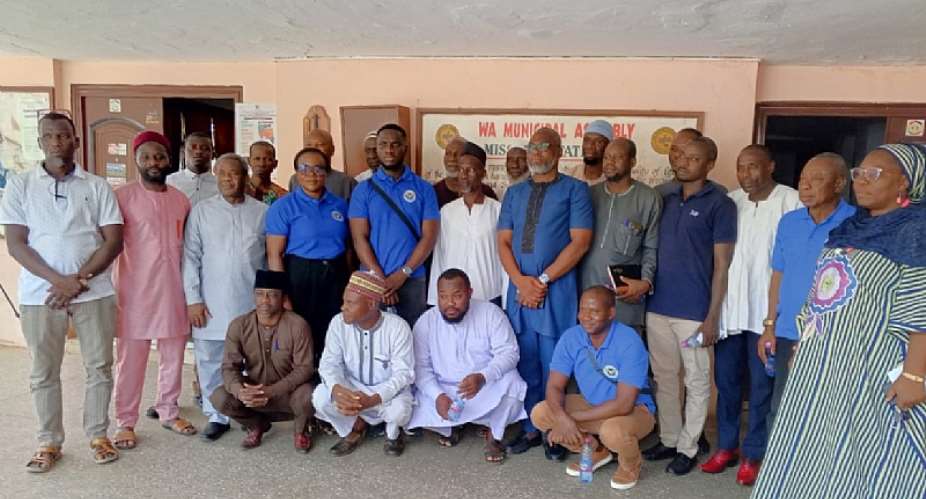Madam Akosua Danquah Ntim Sekyere, Coordinator of the “See Something Say Something” campaign of the National Security, says Ghana being the only country within the West Africa sub-region that has not suffered terrorist attacks does not mean the country is immune to the attacks.
She said there was the need for the government to put in proactive measures rather than to sit aloof and suffer an attack before going into firefighting.
She said that informed the introduction of the 'See Something Say Something campaign' to encourage the citizens to report suspected security issues in their localities for swift action.
Madam Sekyere said this during a meeting with religious leaders in the Wa Municipality as part of a regional sensitisation tour by the National Security to educate the public on the “See Something Say Something” campaign and to encourage the people to call the toll-free line, 999, to report suspected security issues.
She said National Security was carrying out a nationwide citizen sensitisation on the “See Something Say Something” campaign to enable the citizens enhance their security consciousness.
“Whenever they spot anything suspicious within their community, within their space, they share such information with the security agencies or call the toll-free line (999) that the government has made available and report what they’ve seen to us, so we’ll be able to take charge of the situation on time,” she explained.
Madam Sekyere, who is the Team Lead, said violent extremists kept changing their modus operandi and that had made it more imperative that Ghana also adopted strategies to counter those of the extremists.
She said the government, through the National Security, had deviated from the “whole-of-government” approach where the government took charge of national security issues to the “whole-of-society” approach by bringing citizens on board to volunteer information on security issues when necessary.
She observed that the issue of security was a shared responsibility and advanced the importance of engaging the communities for the people to appreciate the need to complement the efforts of government in safeguarding national security.
“One man cannot fight it all by himself. We need the cooperation, the assistance, the support of every well-meaning Ghanaian, everybody resident in Ghana to safeguard our national security,” she indicated.
Mr Kester Osei, a Team Member, educated the people on the accurate reporting of suspected security issues and introduced them to the “SALUTE” reporting format.
The “SALUTE” is an acronym that sought to present a vivid description of the suspected issue of concern-an object, a person or an action.
It described the size of the object or person, the activity of the person that called for attention, the location of the incident, the uniform (colour or type of dress) of the person, the time the incident happened, and the equipment the person operated with such as a camera or a gun.
He, however, warned against prank calls to the toll-free number as that could deny a person with genuine concern access to the Call Centre which could in turn affect the entire nation.
Mr Issahaku Tahiru Moomin, the Wa Municipal Chief Executive, thanked the National Security for carrying out the sensitisation and pledged the support of the Assembly to their activities to help safeguard the security of the nation.
Ther failure of the agents at the 999 toll-free Call Centre to promptly respond to calls by citizens and ineffective implementation of the security mechanisms by the National Security were some concerns the religious leaders raised.
GNA





 Chief arrested for killing soldier at Kasoa over land
Chief arrested for killing soldier at Kasoa over land
 GAF probes soldier’s murder at Kasoa Millenium City
GAF probes soldier’s murder at Kasoa Millenium City
 Ghana steps up effort to pass new Labour law
Ghana steps up effort to pass new Labour law
 AG advises EOCO against money laundering probe into Cecilia Abena Dapaah’s affai...
AG advises EOCO against money laundering probe into Cecilia Abena Dapaah’s affai...
 May Day: I'll prioritise welfare of workers, abolish compulsory retirement age a...
May Day: I'll prioritise welfare of workers, abolish compulsory retirement age a...
 V/R: Adaklu-Tevikpo murder suspect arrested from hideout
V/R: Adaklu-Tevikpo murder suspect arrested from hideout
 Kasoa: Soldier killed by alleged land guards over land dispute — GAF
Kasoa: Soldier killed by alleged land guards over land dispute — GAF
 Fatal shooting of soldier happened at Gomoa East not Kasoa; stop tarnishing our ...
Fatal shooting of soldier happened at Gomoa East not Kasoa; stop tarnishing our ...
 ‘We condemn unprovoked attack in no uncertain terms’ — GAF on fatal shooting of ...
‘We condemn unprovoked attack in no uncertain terms’ — GAF on fatal shooting of ...
 Ghanaians urged to ensure violence free elections on December 7
Ghanaians urged to ensure violence free elections on December 7
